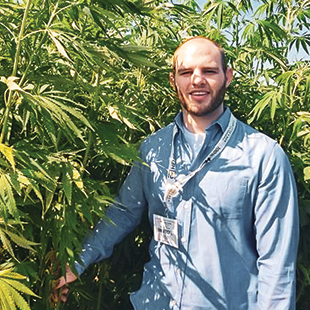GEN NEXT: Grappling With Ganja
Accounting and finance professionals must wrestle with the opportunities of a growing
national cannabis industry if they want to come out on top.
By TAYLOR SCHUCK | Spring 2019

Taylor Schuck knew his athletic career as a wrestler
at Central Michigan University would come to an end
eventually. It’s a reality that every wrestler must
grapple with, as wrestling is a sport that, generally, can
only take you so far before internships and graduation pin
you into submitting to the real-world realities that await
young professionals. What Schuck didn’t know was just
how soon he’d be knocked out of competition. A major
hip injury sustained during his redshirt sophomore year
ended his student athlete career — but it would
surprisingly shape his accounting and finance career.
Below, Schuck, a senior accounting services associate at
Mueller & Co. LLP and Illinois CPA Society member, shares
his story and some insights for his peers.
Undergoing major reconstructive hip surgery ended my
wrestling career and left me as a 20-something in need
of rehabilitation and chronic pain management as I
completed my accounting and finance majors at CMU. In
seeking alternatives to opioid prescription pain killers, I
learned that the state of Michigan had legalized medical
cannabis use in 2008. While not for everyone, I saw the
responsible use of cannabis as a potential option for
recovery. So, following my surgery, I applied for and
received a medical cannabis patient card.
During the next few years, I had the unique opportunity to
experience firsthand a highly unregulated caregiver-driven
cannabis industry. Michigan’s law had little to no
provisions for the licensing of businesses or the testing of
products being sold to patients. This environment forced
patients to either grow cannabis for themselves or find
a caregiver who would grow and distribute their
plant allotment to them. In some municipalities where
provisioning centers could open, patients still suffered
due to the lack of oversight, and the state wasn’t realizing
the full benefit from the revenue that could be generated
through better licensing and regulation of the industry. As
a patient and an accountant-to-be, this raised a lot of
questions and concerns in me, which drove me to learn
more about the cannabis industry and its potential in
Michigan and across the country.
During this same time, my home state of Illinois had
begun licensing medical cannabis cultivation facilities,
dispensaries, and patients under the 2013 Illinois
Compassionate Use of Medical Cannabis Pilot Program
Act. I immediately noticed a substantial difference
between how Illinois and Michigan had approached
legalizing and regulating medical cannabis, and I saw an
opportunity in it.
Following graduation, I moved back to Chicago to work
for Mueller & Co. LLP as an auditor. But my interest in the
cannabis industry hadn’t faded. After building up the
courage to share my story and ideas, I approached the
firm’s leadership about providing professional services to
the cannabis industry and, to my surprise, was given
permission to join various cannabis industry associations,
attend trainings, and participate in industry events as the
firm explored how to offer services to the controversial,
complex, and fast-growing industry.
The fact is that cannabis businesses — then and now —
are in desperate need of accounting, audit, and tax
services, and general business advice. Who better for the
job than an accountant/auditor with firsthand experience
in the industry? So, shortly thereafter, I helped Mueller pick
up its first vertically integrated cannabis manufacturer and
retailer client in northern Nevada. From there, I continued
to network with other accountants and attorneys in the
industry and leveraged my expanding experience and
cannabis knowledge to help Mueller’s cannabis niche
practice rapidly expand.
Since starting the cannabis niche offering at Mueller, I
have moved from audit to the accounting services
department where I now provide cannabis businesses
with ongoing accounting and tax support. Considering
that each state regulates medical and adult-use cannabis
differently, and often regulations are revised several times,
cannabis clients are working in an ever-changing
environment. And, as we see more states legalizing and
regulating cannabis production and use in myriad forms,
we anticipate alterations to federal enforcement will
eventually result in changes to how cannabis businesses
are taxed and access banking and financial services. The
current state of the cannabis industry already requires a
constant need for our guidance and expertise — what’s
to come as it matures?
I never imagined being a medical cannabis patient as an
accounting and finance student would lead me to be a
senior associate leading a new, often controversial,
cannabis niche practice at a midsized CPA firm. It was my
passion, persistence, and willingness to go beyond my
comfort zone, both personally and professionally, that has
allowed me this opportunity. Now, I can even help you find
opportunities in the cannabis industry as the chair of the
Illinois CPA Society’s Cannabis Industry Member Forum.
Existing cannabis businesses will continue to require
increased planning and ongoing support from
accountants and auditors. And as Illinois now moves
towards adult recreational-use legalization, and cannabis
use becomes more prevalent in society overall, there will
be more opportunities for accounting and finance
professionals like us to grow our own opportunities in a
very specialized industry. If you would like to learn more
about serving this industry, please join me at an upcoming
Cannabis Industry Member Forum meeting. The time to
get involved in the cannabis industry was yesterday.
To learn more about the
Illinois CPA Society’s
Cannabis Industry Member
Forum, contact Taylor Schuck or PaigeMcLeod, Illinois CPA
Society volunteer
engagement and
governance manager.